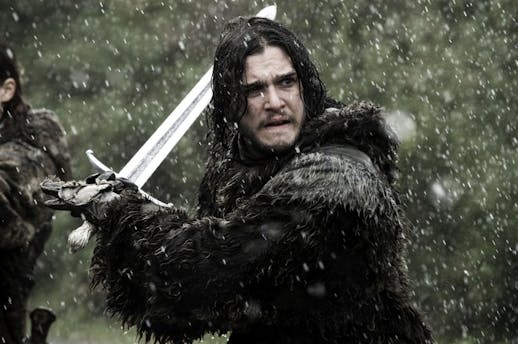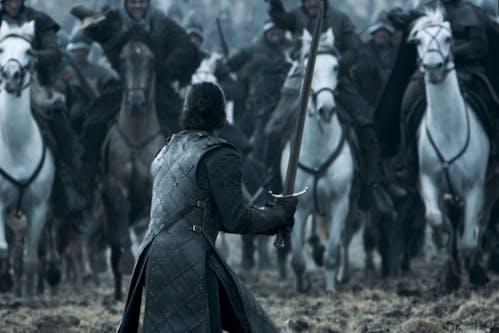To make a story compelling, there needs to be a protagonist the audience gravitates towards; someone who goes through a great struggle and changes due to their experiences. In what is commonly referred to as the hero’s journey, a protagonist often starts off in a bad position, one in which they feel trapped or isolated. Throughout the course of their journey, they learn lessons, face difficult situations and end up altered internally due to their treacherous growing process.
Such is the case for “Game of Thrones” protagonist Jon Snow, a character who throughout the course of seven seasons has faced a number of grueling challenges that have tested his leadership and personal growth abilities to the nth degree. While being a pop culture icon and bad-ass swordsman, what makes Jon Snow such a tremendous character is his character arc, the journey he embarks on throughout the course of the show and how we as an audience get to experience a lonely outcast become the savior of the world.
When we are first introduced to Jon Snow, we see him as the black sheep of the Stark family. Jon bonds with those around him nicely, yet is constantly tortured by his identity as Ned Stark’s bastard and not a true Stark. Jon feels alienated at Winterfell, constantly desiring something he can’t have and wanting to fit in. Envious of Robb, Jon mostly spends his days alone, being excluded from major feasts, practicing his swordsman skills alone and being disrespected by Catelyn.
Jon decides that he is better suited to dedicate his life to the Night’s Watch. He has no chance of finding a woman, has no real family, never knew his mother and has no friends outside of Arya, Bran and Robb, making him venture out to the edge of the world to protect the Seven Kingdoms with other misfitted men. Jon’s bond with Samwell Tarly is instantly one of the show’s greatest duo’s, two troubled young men facing the social burdens of family rejection and separation from women. Sam looks up to Jon due to his leadership skills, the two having a number of heartwarming talks.

While finding his place as a steward for Lord Commander Mormont, Jon again is noted for his leadership qualities by the Old Bear as well as his rival Sir Alliser Thorne, despite being rejected for a position as a ranger - Jon yet again not being able to get what he desires. His uncle Benjen Stark, who recruited him for the Night’s Watch, senses Jon’s abilities, as do his goofy friends Grenn and Ed.
During his quest beyond the wall in season two, Jon captures the Wildling Ygritte, who he soon falls in love with. After having the tides turned on him and captured by the Wildings, the King Beyond the Wall Mance Rayder also notices Jon’s confidence and intriguing personality. While infiltrating the Wilding army in season three, we see Jon torn between supporting the woman he loves and defending the innocent from the savagery of the Wildlings: the first major moral conflict this vulnerable man has experienced.
After a sad confrontation with Ygritte in which she severely wounds him, season four is when Jon becomes a hero, defending the Wall against the Wildings, avenging Lord Commander Mormont’s death by defeating the mutineers of the Night’s Watch and personally going beyond the wall again to deal with Mance Rayder.

In season five, Stannis, Davos and Melisandre all see the potential and already evident skills of Jon. After being elected Lord Commander of the Night’s Watch, we see him conflicted yet again, beheading the disobedient Janos Slynt and forming a pact with the Wildlings to defeat the Army of the Dead, against the will of his fellow brothers. Following an intense battle at Hardhome, Jon is assassinated by the Night’s Watch for his pact, his journey into becoming a hero seemingly over.
To our happiness, Jon is resurrected in season six by Melisandre, instantly reuniting with Sansa and being convinced to take back Winterfell from the sadistic Ramsay Bolton. Jon is tested as a leader once again as he forms the best army he can, and with the help of Sansa and Littlefinger is able to take down Ramsay to reclaim his home.
Season six is Jon’s most important. This is when he not only fights for what he truly loves (his home), but we see him be claimed King in the North after his shocking victory. Jon, being an unnoticed and marginalized bastard, had always dreamed of being a Stark. But never imagined he would be seen as one, let alone be crowned the king of the entire North. In addition, we learn through Bran’s visions that Jon isn't even a bastard, but the natural born son of Lyanna Stark and Rhaegar Targaryen (although we don’t find out he’s Rhaegar’s son until season 7).

When Jon decides to form an alliance with Daenerys in season seven, we see him finally interact with his female equivalent, a woman who was subjected by society and eventually rose to power. Jon and Daenerys have an interesting relationship, the two eventually falling in love. In a journey beyond the wall to capture an undead wight, Jon is on a quest to save the world from the Night King; his extensive experience in fighting and leadership making him the best candidate to do so.
Jon Snow’s journey has been an exciting one: an adventure filled with pain, triumph and grief. Jon’s emotional and situational vulnerability allows us as an audience to be continually invested in his growth. He’s been in danger more times than we can count, has been close to death in several episodes, and eventually does pass away before being resurrected. This aspect of constant danger leaves us caring for Jon even more, for the sad boy who couldn’t find his place in the world is now a hero who is a savior for humanity.
Jon is a character that everyone senses greatness in. Whether it be his uncles Ned and Benjen, his friend Sam, Lord Commander Mormont, Sir Alliser Thorne, Mance Rayder, Tormund, Ygritte, Davos, Melisandre, Stannis, Lyanna Mormont, Aemon Targaryen, Tyrion, Daenerys, Jorah, Beric Dondarrion and even the Night King, nearly every character in the show sees Jon as a noble leader, which causes them to either respect, love, or hate him.
The key to Jon’s journey as a hero comes from Maester Aemon Targaryen. When asking for advice on whether or not to untie the Wildings and Night’s Watch, the old man answers, “Kill the boy. And let the man be born.” This quote is essential to who Jon is as a character. Throughout the show we have seen a lonely misfit boy turn into a hero, a man who has been challenged with difficult decisions, brutal battles, heartbreak, betrayal, loss and even death. Jon Snow has evolved from a boy into a man, a noble hero who despite his bravery and rise to power has had a harrowing struggle to get to where he is.
Jon’s irony comes from the fact that for most of his life he has been treated as a meaningless bastard, when in fact he is the rightful heir to the Iron Throne. Even more ironic, Jon has no desire to sit on the Iron Throne or hold any seat of power. Jon is a true hero, the reason being he wants to save the world from the White Walkers due to the good of his heart, making him a man of principle and goodwill.
Through experiencing Jon transform into a mighty hero, we’ve been able to examine one of the most classic patterns of storytelling: the hero’s journey. No character in “Game of Thrones” has expressed this more than Jon Snow (his birth name Aegon Targaryen). As the show approaches its final season, it’s only fitting that Jon get a bittersweet yet rewarding end, leaving Westeros in the hands of a strong leader and a true hero.
Dominic LeRose is a staff writer for the Daily Cardinal. To read more of his work, click here.






